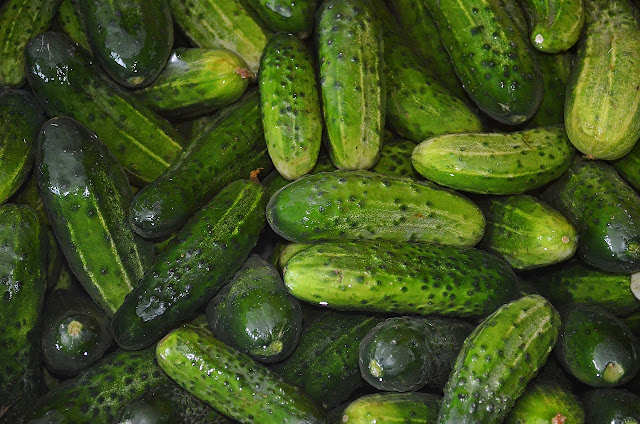Cucumber
Cucumber is a type of plant that belongs to the gourd family, which includes other vegetables such as pumpkins, squash, and melons. Cucumbers are commonly used in salads and sandwiches, as well as pickled as a condiment or snack. They are known for their refreshing and crisp taste and are often used in cuisines around the world.
Cucumbers are usually cylindrical in shape, with a smooth, dark green skin and a pale, juicy interior. They are rich in nutrients such as vitamins C and K, potassium, and dietary fiber. Additionally, cucumbers are low in calories, making them a popular choice for those looking to maintain a healthy diet.
In addition to their culinary uses, cucumbers have also been used for medicinal purposes, such as in traditional Chinese medicine to treat a variety of ailments. The juice from cucumbers is also known for its hydrating properties and is often used in skincare products.
Use of cucumber
Cucumbers have a wide range of uses in both culinary and non-culinary settings. Here are some examples:
Culinary uses :- Cucumbers are commonly used in salads, sandwiches, and wraps, either sliced or diced. They can also be used as a snack. Cucumber juice can be used in cocktails and smoothies, and cucumber slices can be used as a garnish. In some cuisines, cucumbers are cooked or served warm, such as in soups or stews.
Skincare :- Cucumbers are known for their hydrating and soothing properties, and are often used in skincare products such as moisturizers, toners, and masks. To reduce puffiness and dark circles under the eyes, slices of cucumber are often placed on the eyes to provide relief.
Medicinal uses :- Cucumbers have been used in traditional medicine to treat a variety of ailments, such as headaches, inflammation, and digestive issues. They are also known for their diuretic properties, which can help to flush toxins from the body.
Household uses :- Cucumber slices can be used to remove stains and clean surfaces, such as kitchen counters or bathroom tiles. They can also be used to reduce odors, such as in the refrigerator or garbage disposal.
Overall, cucumbers are a versatile and nutritious vegetable with a wide range of uses in both culinary and non-culinary settings.
5 Benefits of Cucumber
Cucumbers offer a number of benefits for health and wellness. Here are five benefits of cucumbers:
1. Hydration
One of the major benefits of cucumber is the ability to support hydration. Cucumbers are mainly made of water, which contains about 96%of the water content. This makes them an excellent food option to support hydration, especially during the warm weather or physical activity period.
When the body is well hydrated, it can function optimally. Water is necessary for various physiological processes, including digestion, circulation and waste removal.
In addition to providing water, cucumbers also contain electrolytes such as potassium, which can help re -fill the body’s reserves of the essential minerals lost through other forms of sweat or fluid damage.
Read also :- Who should avoid coconut, what are its health benefits and side effects
Consuming cucumbers as part of a balanced diet can be an effective way to support hydration and overall health. In addition to eating cucumber as a snack or in salad, drinking cucumber water or adding cucumber slices to smoothies is other ways to include this hydrating vegetable in your diet.
2. Nutrient-dense
Cucumbers are also considered nutrient-dense, which means they contain a variety of essential nutrients that are important for maintaining optimal health. Here are some of the key nutrients found in cucumbers and their potential benefits:
Vitamin C :- Cucumbers are a good source of vitamin C, an antioxidant that helps to protect the body against damage from free radicals. Vitamin C is also important for immune function and skin health.
Vitamin K :- Cucumbers are also a good source of vitamin K, which is important for blood clotting and bone health.
Potassium :- Cucumbers are a good source of potassium, an electrolyte that helps to regulate blood pressure and support muscle and nerve function.
Dietary fiber :- Cucumbers are a good source of dietary fiber, which can help to promote digestive health and prevent constipation.
Other nutrients :- Cucumbers also contain small amounts of other essential nutrients, such as vitamin B6, folate, and magnesium.
By consuming cucumbers as part of a balanced diet, you can help to ensure that your body is getting the essential nutrients it needs to function properly.
3. Weight management
Cucumbers can also be beneficial for weight management, as they are low in calories and high in water and fiber content. Here’s how cucumbers can support weight management:
Low calorie :- One cup of sliced cucumber contains only about 16 calories, making it a great option for those who are looking to manage their weight or reduce their calorie intake.
High water content :- Cucumbers are primarily made up of water, with a water content of about 96%. Eating foods with high water content can help to fill you up and keep you feeling full for longer, which can help to reduce overall calorie intake.
High fiber content :- Cucumbers are also a good source of dietary fiber, which can help to promote feelings of fullness and prevent overeating. Additionally, fiber helps to regulate blood sugar levels and support digestive health.
Read also :- How do you store peas for a long time and know its Benefits.
Versatility :– Cucumbers are a versatile vegetable that can be easily incorporated into meals, making it easy to add low-calorie, high-fiber food to your diet.
Overall, cucumbers can be a great addition to a weight management plan, as they are low in calories, high in water and fiber content, and easy to incorporate into meals.
4. Antioxidant properties
Cucumbers also contain antioxidants, which are compounds that help to protect the body against damage from harmful molecules known as free radicals. Here are some ways in which cucumbers’ antioxidant properties can benefit your health:
Reduced risk of chronic diseases :- Antioxidants in cucumbers, such as vitamin C and beta-carotene, can help to protect cells from damage caused by free radicals. This can reduce the risk of chronic diseases such as cancer and heart disease, which are often associated with oxidative stress and inflammation.
Improved skin health :- Cucumbers contain antioxidants that can help to protect the skin against damage from UV radiation and environmental pollutants. This can help to reduce the appearance of fine lines, wrinkles, and age spots, and promote overall skin health.
Immune support :- Antioxidants in cucumbers, such as vitamin C, can help to support immune function and reduce the risk of infections.
Anti-inflammatory properties :- Some compounds found in cucumbers, such as cucurbitacins and flavonoids, have been shown to have anti-inflammatory properties. This can help to reduce inflammation throughout the body and protect against chronic diseases.
Overall, cucumbers’ antioxidant properties can offer a variety of health benefits, including reducing the risk of chronic diseases, supporting skin health, and promoting immune function. Eating cucumbers as part of a balanced diet can be an effective way to incorporate these antioxidants into your diet.
Read also :- 14 benefits of heart health by consuming pomegranate
5. Digestive health
Cucumbers are also beneficial for digestive health due to their high water and fiber content. Here are some ways in which cucumbers can support digestive health:
Improved hydration :- As mentioned earlier, cucumbers are primarily composed of water, with a water content of about 96%. Eating foods with high water content can help to keep the body hydrated and support digestive health.
Promoting regularity :- Cucumbers are a good source of dietary fiber, which can help to promote regular bowel movements and prevent constipation. This can help to support digestive health and reduce discomfort.
Prebiotic properties :- Cucumbers contain a type of fiber called inulin, which acts as a prebiotic. Prebiotics help to feed the beneficial bacteria in the gut, promoting a healthy balance of gut bacteria and supporting overall digestive health.
Anti-inflammatory properties :- As mentioned earlier, cucumbers contain compounds with anti-inflammatory properties. This can help to reduce inflammation in the gut and support digestive health.
Overall, consuming cucumbers as part of a balanced diet can be an effective way to support digestive health. Cucumbers can be eaten as a snack, added to salads, or used in smoothies or juices to provide hydration and fiber to the diet.




